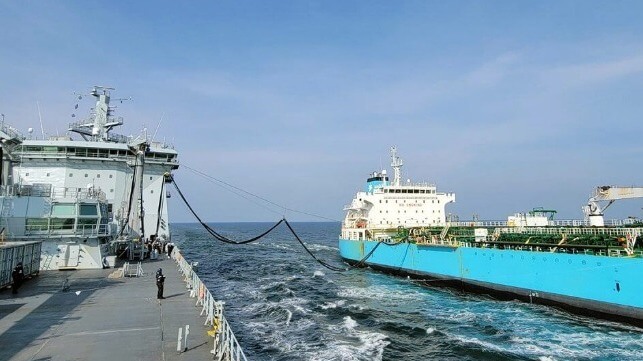Royal Navy Tests Out Underway Refueling With a US-Flag Merchant Tanker

Faced with the need for heightened preparedness in Europe, the navies of the U.K. and the U.S are looking at the possibility of using commercial tankers to carry out at-sea refueling for warships.
As the Russian invasion of Ukraine continues, the Royal Navy has announced that it has been paving the way for NATO to use commercial tankers for underway replenishment after its auxiliary ship Tidesurge linked up with the U.S.-flagged, government-chartered tanker Maersk Peary in Lyme Bay.
The Royal Fleet Auxiliary (RFA) supports Royal Navy warships on operations around the globe, and it joined forces with its American counterpart, US Military Sealift Command, which chartered the Peary for the trials.
The resulting replenishment at sea (RAS) test saw the refuelling rig from Tidesurge successfully sent across to the Peary, where it hooked-up with a replenishment station.
Although no fuel passed between the two ships, the successful connection proved the ability of the civilian tanker to connect with a military vessel. This evolution could be used to sustain warships if the fleet auxiliary tankers are unable to stock up on supplies by putting into port.
The Royal Navy relied on extensive support from civilian tankers during the Falklands conflict, when British shipping had to support a task group 9,000 miles from the U.K. However, in recent years direct ship-to-ship tanker support has not been needed, and the training has not been practiced.
“Replenishment at sea from a commercial tanker to a fleet replenishment oiler can ensure our navies remain supplied and supported in a contested environment when port visits for resupply can’t be accomplished,” said Captain Douglas Jaarsma, the US MSC Exchange Officer with the RFA.

that matters most
Get the latest maritime news delivered to your inbox daily.
The successful trial of oil transfer could extend from the two support forces to the rest of NATO, as the equipment is largely standard across the alliance.
“This exciting trial is the first step for the Royal Navy in developing an organic national capability to consolidate fleet replenishment oilers from commercial vessels. It has delivered assurance to both nations that the ability to work together remains a key tenet,” said Captain Sam Shattock, the RFA Chief Operator.
